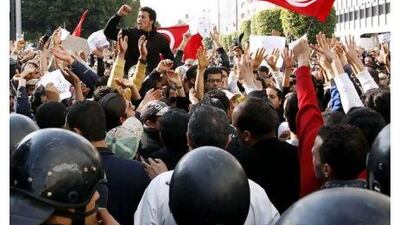TUNIS // The coalition government is wobbly, the army is in the streets and protesters clamouring for a new cabinet were massed in the Tunisian capital yesterday for the third straight day. Watching from a cafe terrace, Murad Raissi, 26, could not help smiling.
"Today for the first time I'm drinking my coffee in the freedom we've been seeking," he said. "Before, we had no right to say anything against the regime."
Tunisia was unmuzzled last Friday when protests drove the former president, Zine el Abidine Ben Ali, from power.
Today a new coalition cabinet scrambling to keep order is expected to hold its first meeting, a day late and two days after four opposition members backed out amid anti-government demonstrations.
Yesterday, a Tunisian prosecutor opened an investigation into the overseas assets of the ousted president and his deeply resented family. Meanwhile, the Swiss president said that her country's federal council agreed to freeze any assets in Switzerland belonging to Mr Ben Ali, to help work up a possible criminal case.
The new government is tasked with organising presidential and legislative elections in the coming months, which Tunisians hope will open a new era of democratic rule. But it has already run into opposition from protesters bent on purging politics of the remnants of Mr Ben Ali's regime.
On Tuesday three ministers from the General Union of Tunisian Workers (UGTT) resigned, and another opposition leader refused to take up his post as health minister.
Yesterday several hundred protesters gathered in Avenue Habib Bourguiba, Tunis's central promenade, demanding that the new cabinet be refashioned to exclude Mr Ben Ali's political machine, the ruling Constitutional Democratic Rally party (RCD).
"I could have accepted the RCD if they hadn't taken the main ministries," said Driss Kais, 35, an accountant in suit and topcoat. "But they have finance, foreign affairs, defence - everything that counts."
On Tuesday, Prime Minister Mohamed Ghannouchi and Tunisia's interim president, Fouad Mebazaa, resigned from the RCD, while opposition members of the government have argued that sidelining the party would be unrealistic. For some, those appeals ring hollow.
"The only answer is to dissolve the RCD altogether," said Choyakh Houssine, 31, a university economics lecturer, demonstrating yesterday in Tunis.
Many of the protesters held signs reading "RCD Out" in English, and one man strolled about with a home-made poster showing a tree marked RCD being uprooted by a hand labelled "the people".
Along the avenue, dozens of riot police carrying batons and tear-gas launchers leaned on their plastic shields, watching the protest.
Police have beaten off similar protests in previous days, but the gathering yesterday was disrupted only by the passage every few minutes of tram cars in the street.
Tunisians have acquired a new vogue for street politics since protests over unemployment and corruption that began in rural towns last month accelerated into demands for Mr Ben Ali to step down. He fled last Friday after thousands in Tunis demonstrated in front of the interior ministry.
"I marched on Friday, enchanted by what was happening," said Mr Raissi, who manages the Tunis office of a French company that offers psychological and legal help to gambling addicts. "Then I got stuck in the office that night by the curfew, watching Al Jazeera."
Security deteriorated rapidly after Mr Ben Ali's exit, with authorities imposing a state of emergency as looters ransacked shops and the army traded fire over the weekend with gunmen from the ousted president's security force.
Mr Raissi made his way home last Saturday and took up a wooden stave to defend his neighbourhood alongside other residents. By yesterday, central Tunis had regained a degree of calm, with cafes and some shops opening and crowds swirling past the tanks parked on Avenue Habib Bourguiba.
United Nations human rights officials will go to Tunisia next week to help investigate the violence and advise the new coalition government on justice and reforms, UN High Commissioner for Human Rights Navi Pillay said yesterday. At least 117 people died, including 70 killed by live fire, in the five weeks of demonstrations which led to the ousting of Mr Ben Ali, she said.
As violence subsides, the concerns of Tunisians are increasingly focused on their hopes for the future.
"I want to express myself openly," said Mr Raissi. "I want no more blocks on the internet; I want permanent correspondents of Al Jazeera and Al Arabiya; I want to go to a polling station and vote for the person in whom I see a leader."
Drinking orange juice at the table beside him, Mr Raissi's friend Sawsen Ben Romdhane, 32, shares those desires. She also wants a job in her chosen field, tourism.
"Before, I could never get one even though I have a degree for it because I lacked the right connections," she said. "Now I think I can do it."
Mr Ghannouchi has promised free elections and said that the government will investigate corruption, political reform and the unrest of the past month. Yesterday the government ordered the release of political prisoners.
But critics note that banned political parties including an Islamist movement decimated by Mr Ben Ali in the 1990s have not received a clear go-ahead to enter politics. Meanwhile, crisis over the interim cabinet's make-up has prompted fears that the traditionally apolitical army could impose military rule.
"I'm proud to have marched on Friday, and I don't like seeing politicians fighting over our efforts as if they're a cake to be divided," said Mr Raissi. "I don't want to see our revolution get blown away by the wind."
* With additional reporting by Associated Press and Reuters

